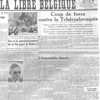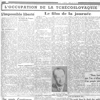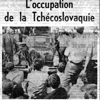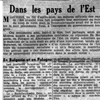National Content: Belgium
Feat of strength against Czechoslovakia
| Source | « La Libre Belgique », n° 235, the 22th of August 1968, P.1, 3, 4, 5 |
| Event referred to | 20th of August 1968 : USSR invasion of Czech Republic |
| Technological characteristics | Type of file: Image Extension : pdf Characteristics Dimension of the file: < 2000 Ko Availability proposed: pdf document with zoom options |
| Description of the source | Kind of source: Newspaper article Origin of the source: Archives of the University of Liège (Belgium) Language: French Copyright issues: reproduction and pedagogical exploitation authorized in the framework of the MHM project |
| Contextualisation of the source | « La Libre Belgique » is an important French-speaking newspaper. Started in 1884 under the title «Le Patriote», it become «La Libre Belgique» just after World War II. This daily paper of Catholic conservative trend is edited in Brussels. It sets itself against the influence of the syndicates in politics and it defends a very liberal economic policy. It is especially read in the large urban areas as well as in the small rural townships, by all social classes. In 1967, 170.000 copies were daily edited (J. GOL, Le monde de la presse en Belgique, édition du Centre de Recherche et d’Information socio-politiques – CRISP- 1970) |
| Interpretation of the source | Half of the first page of the 22th August 1968 is dedicated to the Czechoslovakian events. Three articles and one picture take stock of these events. The events leading to that crisis are chronologically recounted in a frame. Another article approaches the question of the future : How to emerge from that crisis ? The journalist also wonders why the Russians have acted that way and he tries to find an answer. The dominating tone on this first page is however incomprehension and also a feeling of reproach. |
| Original Contents | EXTRAIT : « Cette approche différente devrait éviter un massacre mais cela ne change rien au fond du problème : un pays est envahi et muselé par la force ; si aujourd’hui l’usage de la force est moins apparent, l’hypocrisie est plus écœurante encore. Car – et sur ce point la concordance avec les événements de Budapest est totale – il y a eu négociations dans les deux cas et c’est à l’abri de garanties solennellement accordées aux Hongrois et aux Tchécoslovaques que les deux invasions ont été préparées et mises en route. On ne met pas d’accord, en une heure de temps, cinq armées (russe, est-allemande, hongroise, polonaise et bulgare) sur l’occupation minutieuse d’un pays. Il est évident que l’occupation de la Tchécoslovaquie a été mise au point et réglée dans ses détails, au moment même où les accords de Cernia et Bratislava ont été scellés par les embrassades que l’on sait. Judas ressuscité ! » |
| Original Contents (English Translation) |



